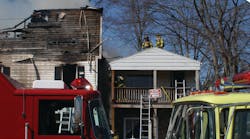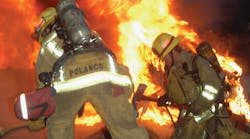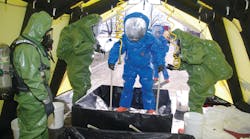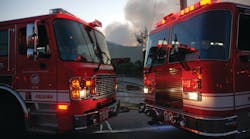20 Tough Questions For the Fire Chief: Are You Prepared To Answer Them? Question 12
As budgets have become tighter, many fire departments have been forced to find ways to reduce operating costs. Many of the “20 Tough Questions” are focused on the benefits and consequences that result from creative problem solving. Question 12 deals with the concept of reducing operating expenses by closing fire stations temporarily as staffing reductions dictate.
In some jurisdictions where staffing reductions have been implemented there may not be adequate personnel to staff the apparatus in each station. Permanently closing a station can have serious political consequences, however, as residents and business owners tend to value a certain level of protection from risk that comes from having a staffed fire company that can respond quickly in the event of an emergency.
Where overtime budgets have been reduced and minimum staffing is a standard or contractual obligation, the options become limited. One strategy that can be deployed by city officials to prevent having to endure the backlash of permanently closing a fire station is to invoke rolling brownouts. This means a fire station is not permanently closed. Rather, apparatus are taken out of service on a temporary basis. The duration can be as short as one shift or for months. The brownout may be slated for a single station or can rotate among stations. It can impact one piece of equipment, such as a ladder company, or it can be rotated among various apparatus. There are no rules for how a department browns out companies.
No matter what name is chosen for it, temporarily closing a fire company or a fire station is, nonetheless, a closure. While the incidence of fire or medical emergencies (for those fire departments that also respond to medical calls) may be greater in some areas of some cities, the occurrence of fires or medical emergencies are not completely predictable. And this begins the discussion on the challenges of brownouts.
Determining risks
Arguably, it is the role of government to provide equal access to a basic level of services and protection from danger for all citizens without prejudice or discrimination. The periodic closure of a fire company or a fire station denies the taxpaying citizens and businesses served by that company or station the same level of service that those living in the non-browned-out areas receive. Which companies or stations to brown out can be the focus of great debate. This is a decision that should directly involve the elected officials, as it is the elected officials who are accountable to the citizens who elected them. When a fire company or station is browned out, risk increases. This includes risk to the citizens, risk to businesses owners, risk to visitors and risk to firefighters.
Let’s compare the equivalent of a fire company brownout with examples for how the concept could apply to other services or obligations of government. (Remember, to brown out a fire company means to close it, even if only for short periods.)
• Handicapped-accessible ramps – Let’s say the city decides that handicapped-accessible ramps are going to be browned out, meaning wheelchair-bound citizens will not be able to access City Hall on Mondays. If it is a rolling brownout, then the ramps will be closed on Monday one week, Tuesday the next week, Wednesday the next week, etc. Handicapped citizens won’t know, in advance of arriving at City Hall, which day the ramps are open (much like the citizens won’t know which fire companies are open or closed until they have their emergency). This could be remedied with a telephone call to City Hall each day from a citizen to learn whether the ramps are open or closed, followed by a decision to postpone the visit on any day the ramps are closed. Unfortunately, citizens cannot choose which days they will have a fire or medical emergency based on whether the fire company is open or closed.
• Baseball fields – The baseball fields in city parks are going to be browned out, meaning the fields will be closed on Mondays. If it’s a rolling brownout, the fields will be closed on Monday one week, Tuesday the next, etc., just as in the example of the accessible ramps above. If teams show up to play a game and don’t know the fields are closed, they are going to be angry – and rightfully so. The teams had a reasonable expectation that if their game was scheduled on a given day at a given time, the field should be open.
Risk management
A fire department that considers brownouts as an option to reduce operating costs can benefit from looking at the decision from a perspective of risk management. Managing risk is all about probabilities, not possibilities. In fact, anything is possible and it is not realistic for a fire department to be equipped, staffed, trained and prepared to handle anything. What’s more realistic is for the fire department to be equipped, staffed, trained and prepared to handled the emergencies it is most likely to experience (i.e., high-probability events) and to have a plan for how to manage emergencies that will only rarely happen – if they happen at all (i.e., low-probability events).
The decision to brown out a fire company or station should be rooted in risk management. This is where data can aid in the decision-making process. Demand for services ebbs and flows based on time of day and day of week. Logic would say staff when and where the probability of an emergency is greatest. For example, a company or station may be very busy during the weekday and the number of critical calls declines at night (e.g., the company or station is in an area that is predominantly retail and calls for service decline sharply when the stores are closed), so it may make sense to brown out a company or a station in that area at night. It may be risky to brown out companies or stations randomly without consideration for probabilities of critical calls. For example, browning out a company or station when the station is known to be busy increases risk.
The reality is, companies are browned out all the time. Every time a company responds to a call (i.e., “red out”), it is out of service – closed. While a company is out of service handling one emergency call, it is essentially “browned out” for responding to another emergency call and this is going to cause a delay in service as the replacement company comes from another station. Depending on how busy a station is, the occurrence of simultaneous calls can range from infrequent to common.
Browning out a company, when done with deference to risk management, can be an effective way to reduce operating costs while reducing the impact of putting a company or station out of service. Browning out a company or station can reduce overtime costs. This can, in turn, prevent the permanent closure of a company or fire station and may also prevent a reduction in staff.
Summary
Browning out a fire company or a fire station, while an option to balance a budget, does impact service levels and increases response times. However, when all other possible cost-reduction measures have been taken, brownouts are an option that may reduce operating costs, avoid station closings and prevent layoffs.
RICHARD B. GASAWAY, Ph.D., has served for more than 30 years in public safety, including 22 years as a chief fire officer. He holds bachelor’s, master’s and doctor of philosophy degrees in finance, economics, business administration and leadership. Dr. Gasaway operates the Situational Awareness Matters! website (www.SAMatters.com). He provides programs on firefighter safety and leadership to departments throughout the United States and Canada. Dr. Gasaway also hosts the Leader’s Toolbox podcast radio show on Firehouse.com. RICHARD C. KLINE has been the fire chief for the City of Plymouth, MN, since 1992 and is a senior associate at the Gasaway Consulting Group. He holds a master’s degree in public safety and is a credentialed chief fire officer through the Commission on Public Safety Excellence. Kline is the chairman of the Minnesota State Fire Chief Association’s Safety and Health Committee. The authors can be reached at: [email protected] or 612-548-4424.

Richard Kline
RICHARD C. KLINE is a 40-year fire service veteran who recently retired from the Plymouth, MN, Fire Department, following 23 years of service as fire chief. He is a frequent regional and national speaker who covers topics that relate to command competencies and firefighter safety and health. Kline can be contacted at [email protected].









